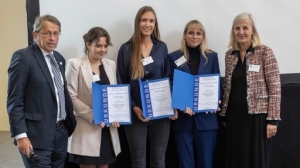The legal dilemma of triage

When there is a terrible disaster with lots of seriously injured people and there are not enough medical resources available to help them all, physicians have to make difficult decisions about who gets help – and who does not. This process is called triage.
During the coronavirus pandemic, the legal regulation of triage became a matter of focus, and a new law governing triage in Germany was instated in 2022. However, current regulations on triage present physicians with a dilemma, explains Konstanz-based legal expert Alexandra Windsberger: The German law governing triage prohibits using criteria such as age, infirmity and chronic illnesses as a basis for medical decisions. "The most reliable triage criteria are prohibited in Germany", Windsberger says. The consequence: Performing triage under current German regulations would lead to more fatalities than necessary – and criminalize physicians who allocate assistance based on medical criteria. Alexandra Windsberger calls for removing criminal law from triage decisions.
Triage and protecting human dignity
Under Article 1 German Basic Law (Grundgesetz), all lives are of equal value. No one is worth more or less than any other person. "The basic equality of all persons is the greatest achievement of the German Basic Law. It is our most important protection: People cannot be divided into those who are "worth saving" and those who are not", emphasizes Alexandra Windsberger.
"In exceptional situations where triage is used, however, a strict interpretation of Article 1 poses a problem for physicians."
Alexandra Windsberger
In order to save as many people as possible using limited resources, physicians must assess their chances of survival using criteria such as age, infirmity and chronic illnesses. Yet the law prohibits them from doing this, because it could put vulnerable groups at a disadvantage, especially seniors and people with disabilities or chronic illnesses.
It is especially problematic when physicians discontinue the treatments of certain people so that others with a greater chance of survival can receive them, or when medical resources that have already been allocated are redistributed (ex post triage). Under current regulations, physicians can be prosecuted in such cases, and could face the charge of manslaughter and a life sentence for actively withdrawing medical assistance from a person who dies as a result.
© Axel JoerssThe Konstanz-based legal expert Alexandra Windsberger studies matters of criminal law involving failure to render assistance, especially with regard to medical law. This includes not only failure to render assistance, but also medically assisted suicide and the German law governing triage.
Alexandra Windsberger is an academic staff member of the University of Konstanz's research team "Criminal Law, Criminal Procedural Law, Comparative Law, Medical Criminal Law and Legal Theory" led by Liane Wörner.
Maximum level of equal treatment or optimum level of efficiency?
There are two main currents in the legal philosophy of triage:
-
The egalitarian position holds closely to Article 1 of German Basic Law and concludes that triage should not permit unequal treatment of patients. The question of how limited resources should be distributed would thus have to be decided by chance. The problem with the egalitarian position: There is a high probability that medical resources would not be distributed efficiently. As a result, fewer lives would be saved.
-
The utilitarian position, on the other hand, seeks to save as many lives as possible. The guiding principle is to maximize the results and distribute resources as efficiently as possible, also allowing for the potential redistribution of previously allocated resources (ex post triage). The problem of the utilitarian position: It weighs chances of survival – and thus individual lives – against each other:
According to simulation studies by the University of Augsburg, the utilitarian approach (including ex post triage, which is prohibited in German) would lower mortality by six percent.
"Current legislation prescribes the method associated with the highest rate of mortality. There is no justification for sacrificing efficiency in this way".
Alexandra Windsberger
More decision-making authority for physicians
Alexandra Windsberger advocates for giving physicians more decision-making authority in triage situations and decriminalizing (ex post) triage. "As a first step, a lot would be gained by removing criminal law from triage decisions", argues Windsberger. She especially supports ending the strict legal differentiation between action and failure to render assistance. Windsberger explains, "Does discontinuing treatment count as an action or a failure to render assistance? This plays a major role in deciding criminal liability. If, for triage, both counted equally, the situation would become less dramatic." Physicians could discontinue treatments of some patients in order to treat others with a higher chance of survival and redistribute medical resources accordingly, without risking charges of manslaughter.
As a second step, Alexandra Windsberger calls for legislators to allow physicians to use the currently prohibited criteria of age, infirmity and chronic illnesses in triage – under the condition that this only takes place via a transparent and well-documented procedure that must include multiple persons. Alexandra Windsberger concludes, "It is possible to find ways to conduct efficiency-based triage while ensuring human dignity".

For her research on the German law governing triage (Gerechtigkeit und Effizienz? Human empowerment statt Algorithmus und die Rolle des Strafrechts), Windsberger was awarded the 2023 poster prize at the 5th interdisciplinary congress on YOUNG SCIENCE AND PRACTICE hosted by the Hanns Martin Schleyer Foundation and the Heinz Nixdorf Foundation in collaboration with Charité – Universitätsmedizin Berlin. The prize is worth 5,000 euros.

